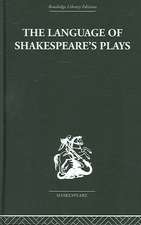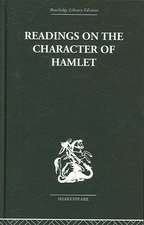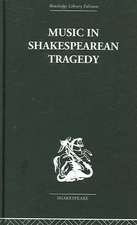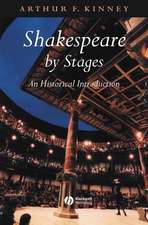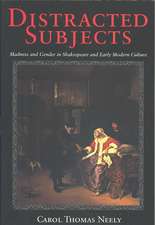Shakespeare’s Common Language: Arden Shakespeare Studies in Language and Digital Methodologies
Autor Alysia Kolentsisen Limba Engleză Paperback – 16 iun 2021
| Toate formatele și edițiile | Preț | Express |
|---|---|---|
| Paperback (1) | 157.44 lei 22-36 zile | +8.97 lei 5-11 zile |
| Bloomsbury Publishing – 16 iun 2021 | 157.44 lei 22-36 zile | +8.97 lei 5-11 zile |
| Hardback (1) | 535.90 lei 43-57 zile | |
| Bloomsbury Publishing – 22 ian 2020 | 535.90 lei 43-57 zile |
Preț: 157.44 lei
Nou
Puncte Express: 236
Preț estimativ în valută:
30.13€ • 31.26$ • 25.18£
30.13€ • 31.26$ • 25.18£
Carte disponibilă
Livrare economică 24 februarie-10 martie
Livrare express 07-13 februarie pentru 18.96 lei
Preluare comenzi: 021 569.72.76
Specificații
ISBN-13: 9781350235977
ISBN-10: 1350235970
Pagini: 208
Dimensiuni: 129 x 198 x 18 mm
Greutate: 0.2 kg
Editura: Bloomsbury Publishing
Colecția The Arden Shakespeare
Seria Arden Shakespeare Studies in Language and Digital Methodologies
Locul publicării:London, United Kingdom
ISBN-10: 1350235970
Pagini: 208
Dimensiuni: 129 x 198 x 18 mm
Greutate: 0.2 kg
Editura: Bloomsbury Publishing
Colecția The Arden Shakespeare
Seria Arden Shakespeare Studies in Language and Digital Methodologies
Locul publicării:London, United Kingdom
Caracteristici
Applies
linguistic
theory
to
Shakespeare's
work
focussing
on
the
foundations
of
his
language
use
Notă biografică
Alysia
Kolentsisis
Associate
Professor
of
English
at
St.
Jerome's
University
in
the
University
of
Waterloo,
Canada.
Cuprins
Introduction:
Shakespeare's
Common
LanguageChapter
1:
Language
Change,Coriolanus,
and
'Shall'Chapter
2:
Discourse
Analysis,Troilus
and
Cressida,
and
'Will'Chapter
3:
Pragmatics,Richard
II,
and
'This'Chapter
4:
Grammar,As
You
Like
It,
and
'If'NotesReferencesIndex
Recenzii
Written
in
clear
and
accessible
prose,
Kolentsis's
book
on
the
linguistic
aspects
of
Shakespeare's
dialogues
evolved
from
her
dissertation
research.
In
close
readings
of
quotidian
and
easily
overlooked
words
within
dramatic
dialogue
(e.g.,
will/shall,
if,
here/this),
Kolentsis
(Univ.
of
Waterloo,
Canada)
reveals
her
profound
knowledge
of
the
Shakespearean
corpus
and
linguistic
methods.
The
core
of
the
book
is
four
self-contained
chapters,
each
devoted
to
one
play
and
each
applying
a
linguistic
approach
(such
as
discourse
analysis
or
historical
sociolinguistics)
to
a
small
set
of
words
in
that
play's
dialogues.
The
structure
of
the
chapters
is
well
defined:
each
introduces
the
chapter's
purpose,
describes
the
theoretical
or
methodological
basis
of
the
linguistic
approach
being
applied,
and
then
delves
into
a
close
reading
of
a
play.
The
consistency
of
the
format
allows
readers
or
instructors
to
easily
extract
the
portions
that
are
most
relevant
to
their
research
or
teaching
needs.
Kolentsis's
writing
style,
concise
summaries
of
linguistic
approaches,
and
thoughtful
analyses
of
dialogue
make
this
book
appropriate
for
nonspecialists
and
specialists
alike.
Summing
Up:
Recommended.
Lower-division
undergraduates
through
faculty.
This book brings Shakespeare's verbal experimentation with some of the most frequently used "small" words of the English language (shall, will, this, and if) vividly to life. Writing in a highly accessible style, Kolentsis equips students with innovative approaches to close reading that fruitfully combine literary and linguistic analysis to illuminate key dynamics of the drama
This book brings Shakespeare's verbal experimentation with some of the most frequently used "small" words of the English language (shall, will, this, and if) vividly to life. Writing in a highly accessible style, Kolentsis equips students with innovative approaches to close reading that fruitfully combine literary and linguistic analysis to illuminate key dynamics of the drama







